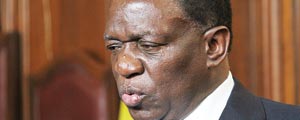
THE State yesterday conceded that Section 31 (a) (iii) of the Criminal Law (Codification and Reform) Act which criminalises publishing or communicating statements deemed as prejudicial to the State did not constitute an offence under Section 20 of the old Constitution.
PHILLIP CHIDAVAENZI
Chief Law Officer in the Prosecutor-General’s Office Chris Mutangadura made the admission after he appeared at the Supreme Court on behalf of Justice minister Emmerson Mnangagwa who had been invited to show cause why certain sections of the Constitution should be struck off.
Mnangagwa was challenging an earlier ruling by the same court which said the Act violated people’s rights to freedom of expression.
The court ruling followed an application by Alpha Media Holdings Group Editor-In-Chief Vincent Kahiya and former NewsDay editor Constantine Chimakure challenging the section which criminalised “publishing or communicating statements prejudicial to the State”.
There were also two similar challenges lodged by Bulawayo–based Gukurahundi artist Owen Maseko and MDC –T legislator Pishai Muchauraya.
The full ConCourt bench led by Chief Justice Godfrey Chidyausiku said the court would give a written order.
“We prefer to give our order in written form,” Chief Justice Chidyausiku said.
- Chamisa under fire over US$120K donation
- Mavhunga puts DeMbare into Chibuku quarterfinals
- Pension funds bet on Cabora Bassa oilfields
- Councils defy govt fire tender directive
Keep Reading
The court did not give the defendant’s lawyers an opportunity to respond after Mutangadura conceded that the facts of the allegations against Chimakure and Maseko did not constitute an offence under Section 20 of the old Constitution.
“It would be an academic exercise to adjudicate over the sections said to violate the Constitution on that note,” he said.
Mutangadura, who had been invited to show cause why certain sections of the Constitution should not be struck off, conceded after his plea to first consult with his principal was turned down by the court.
On the Muchauraya case, the Chief Justice noted that the allegations that the legislator described President (Robert Mugabe) as “old” could not constitute an offence and the actual charge did not correspond to the facts on the State outline.
He also observed that even if falsehoods in the media were made “peaceably”, only the form, and not content, could be criminalised. “The public interest requires that certain facts must be restricted on the basis of their content,” he said.
Although Mutangadura said the maximum imprisonment provision of 20 years in jail provided in the law was meant to envisage a scenario where a breach would have far–reaching consequences, Chidyausiku queried why that had to be specified in the law if the court had that jurisdiction.
“This is meant to bring a chill on the journalist because of fear that he will be sentenced to 20 years in prison,” he said.
Chimakure and Kahiya were charged under Section 31 for allegedly publishing or communicating false statement prejudicial to the State, while Maseko was charged under Section 33 for allegedly undermining the authority of the President through his paintings.
The two journalists were charged after they published a story titled Activists’ abductors named.
Meanwhile, the court reserved judgment in the matter.











